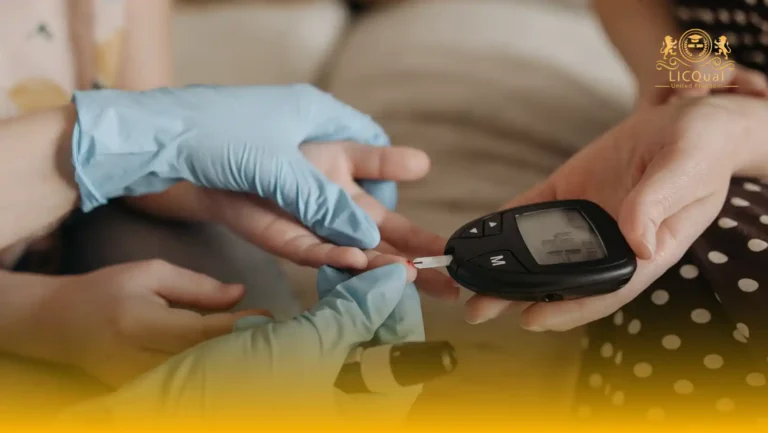The LICQual Level 6 Diploma in Healthcare Informatics and Data Security is a specialist qualification designed for healthcare professionals who are seeking to advance their careers, deepen their expertise, and enhance their Continuing Professional Development (CPD). This advanced diploma provides learners with the essential knowledge and practical skills required to manage healthcare data effectively, ensure robust information security, and support the digital transformation of healthcare services.
Learners will explore the principles of healthcare informatics, data governance, cybersecurity, and regulatory compliance within healthcare organisations. The programme equips learners with the ability to analyse complex data systems, implement security protocols, and drive improvements in information management, ensuring patient data is protected while enhancing operational efficiency.
This qualification is ideal for experienced healthcare practitioners, IT specialists, data managers, and administrators who wish to take a strategic role in healthcare data management and security. It is not intended for entry-level candidates; rather, it is aimed at those with a foundational understanding of healthcare operations who are ready to develop advanced capabilities in informatics and data protection.
Centres delivering the LICQual Level 6 Diploma must maintain high standards of training provision. They are required to employ competent and qualified staff and provide all necessary learning materials and resources to ensure learners achieve successful outcomes. This ensures that every learner receives a high-quality educational experience that meets international standards and supports professional growth within the healthcare sector.
Course Overview
Qualification Title
LICQual Level 6 Diploma in Healthcare Informatics and Data Security
Total Units
6
Total Credits
120
GLH
480
Qualification #
LICQ2200786
Qualification Specification
To enroll in the LICQual Level 6 Diploma in Healthcare Informatics and Data Security , applicants must meet the following criteria:
|
Qualification# |
Unit Title |
Credits |
GLH |
|---|---|---|---|
|
LICQ2200786-1 |
Principles of Healthcare Informatics |
20 |
80 |
|
LICQ2200786-2 |
Healthcare Data Management |
20 |
80 |
|
LICQ2200786-3 |
Data Security and Cybersecurity in Healthcare |
20 |
80 |
|
LICQ2200786-4 |
Healthcare Regulatory and Legal Frameworks |
20 |
80 |
|
LICQ2200786-5 |
Advanced Healthcare Informatics Applications |
20 |
80 |
|
LICQ2200786-6 |
Project and Change Management in Healthcare Informatics |
20 |
80 |
By the end of this course, learners will be able to:
Unit 1: Principles of Healthcare Informatics
- Understand the core principles and frameworks of healthcare informatics.
- Identify the roles and responsibilities of informatics professionals in healthcare organisations.
- Analyse how digital health systems impact patient care and service delivery.
- Evaluate the lifecycle of healthcare data, including collection, storage, and utilisation.
- Examine emerging trends and technologies shaping healthcare informatics.
Unit 2: Healthcare Data Management
- Understand methods for the effective collection, storage, and retrieval of healthcare data.
- Assess data quality, accuracy, and integrity in healthcare systems.
- Apply principles of Electronic Health Records (EHR) management.
- Utilise data analytics to support evidence-based decision-making.
- Interpret healthcare data through reporting and visualisation tools.
Unit 3: Data Security and Cybersecurity in Healthcare
- Explain the principles of data protection, confidentiality, and security in healthcare.
- Identify potential cybersecurity threats and conduct risk assessments.
- Apply security protocols, encryption, and access controls to safeguard data.
- Evaluate regulatory requirements for healthcare data security, including GDPR compliance.
- Develop strategies for incident response and managing data breaches.
Unit 4: Healthcare Regulatory and Legal Frameworks
- Understand the legal obligations related to healthcare data management.
- Analyse compliance requirements with national and international standards.
- Evaluate ethical considerations in the collection, storage, and use of patient data.
- Conduct audits and ensure accountability within healthcare organisations.
- Develop policies and procedures to support effective information governance.
Unit 5: Advanced Healthcare Informatics Applications
- Assess the role of clinical decision support systems (CDSS) in patient care.
- Evaluate telemedicine and remote patient monitoring technologies.
- Apply AI and machine learning techniques in healthcare data analysis.
- Integrate healthcare IT systems for improved operational efficiency.
- Formulate strategic plans for digital transformation initiatives in healthcare organisations.
Unit 6: Project and Change Management in Healthcare Informatics
- Plan and implement healthcare informatics projects effectively.
- Apply change management principles within healthcare environments.
- Conduct risk assessments and develop mitigation strategies for projects.
- Evaluate project outcomes, performance, and return on investment.
- Demonstrate leadership and effective communication in healthcare IT initiatives.
The LICQual Level 6 Diploma in Healthcare Informatics and Data Security is specifically designed for experienced professionals in healthcare and related sectors who wish to advance their careers. This course is ideal for:
- Healthcare Practitioners: Doctors, nurses, and allied health professionals seeking to develop advanced skills in healthcare informatics and data security.
- IT and Data Professionals in Healthcare: IT specialists, data analysts, and systems administrators working in hospitals, clinics, or health organisations.
- Healthcare Managers and Administrators: Individuals responsible for managing healthcare operations, patient records, and data governance.
- Data Governance and Compliance Officers: Professionals ensuring healthcare organisations comply with data protection regulations such as GDPR and other international standards.
- Healthcare Innovators and Strategists: Those involved in implementing digital transformation, telemedicine, or advanced analytics within healthcare organisations.
- Professionals Committed to Continuing Professional Development (CPD): Learners looking to expand their knowledge, enhance career prospects, and take on strategic roles in healthcare data management.
This diploma is not suitable for entry-level learners. It is tailored for individuals with relevant experience and a foundational understanding of healthcare operations who are ready to develop advanced capabilities in informatics, cybersecurity, and data management.
To ensure high-quality delivery and successful learner outcomes, centres offering the LICQual Level 6 Diploma in Healthcare Informatics and Data Security must meet the following requirements:
- Qualified and Competent Staff: Centres must employ trainers and assessors with relevant qualifications, professional experience in healthcare informatics, data management, and cybersecurity, and the ability to support learners at Level 6.
- Comprehensive Learning Resources: Centres must provide learners with access to up-to-date textbooks, digital resources, software, and tools required for healthcare data management, analytics, and cybersecurity practice.
- Appropriate Facilities: Training environments must include classrooms, computer labs, and secure IT systems that support practical exercises, simulations, and online learning activities.
- Assessment and Feedback Systems: Centres must have robust procedures for formative and summative assessments, including practical evaluations, projects, and written assignments, ensuring learners can demonstrate competence.
- Commitment to Continuing Professional Development (CPD): Centres should support learners’ ongoing professional development through workshops, seminars, and access to industry updates.
- Compliance with Regulatory Standards: Centres must adhere to national and international standards for training delivery, data protection, and quality assurance to ensure safe, effective, and ethical teaching practices.
- Supportive Learning Environment: Centres must provide guidance, mentoring, and learner support services to facilitate successful course completion and career progression.
Meeting these centre requirements ensures that learners receive a professional, high-quality educational experience that aligns with international standards and prepares them for strategic roles in healthcare informatics and data security.
Assessment and Verification
All units within this qualification are subject to internal assessment by the approved centre and external verification by LICQual. The qualification follows a criterion-referenced assessment approach, ensuring that learners meet all specified learning outcomes.
To achieve a ‘Pass’ in any unit, learners must provide valid, sufficient, and authentic evidence demonstrating their attainment of all learning outcomes and compliance with the prescribed assessment criteria. The Assessor is responsible for evaluating the evidence and determining whether the learner has successfully met the required standards.
Assessors must maintain a clear and comprehensive audit trail, documenting the basis for their assessment decisions to ensure transparency, consistency, and compliance with quality assurance requirements.







